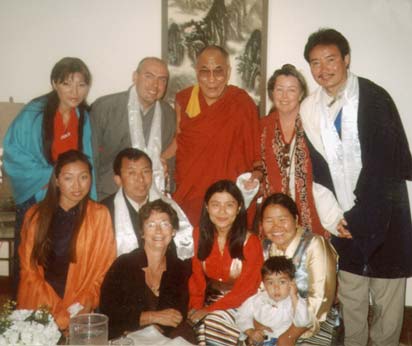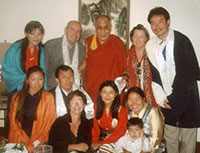19th Annual Tibet Day Report
Chinese Understanding is a Gem at the 19th Annual Tibet Day
by Giovanni Vassallo
Chinese Outreach and "Inreach" were amongst many highlights featured at Tibet: Gem in Asia, Bay Area Friends of Tibet's 19th Annual Tibet Day Cultural Fair held Sunday, November 14, 2004 at a large three-room Fort Mason Conference center in the city of San Francisco. A Chinese Outreach panel discussion at 4pm with Bhuchung Tsering, Director of the International Campaign for Tibet (ICT), who discussed moral and political imperatives, was balanced with comments on Dharma and Inreach by Reverend Heng Sure, a Buddhist leader from The City of Ten Thousand Buddhas, which adheres to Ch'an Buddhism, a Chinese Buddhist tradition. Since everything is mind, if we change ourselves, we can change others, including Chinese people, declared Rev. Sure.
That the most popular vacation spot for mainland Chinese people within the People's Republic of China is Tibet was a remarkable fact revealed by Bhuchung Tsering. When pressed on what local residents of California USA could do to pursue Chinese Outreach, he informed us that the Internet would be a great start. He seemed to suggest that the web is a great place to foment Chinese and Tibetan freedom and democracy through web postings. Though more work needs to be done, he seemed confident that there is a greater Chinese understanding of the Tibetan situation. One example he offered was when a Chinese athlete canceled his planned swim across Namtso, a holy Tibetan lake. Such a swim would have offended the spiritual traditions of thousands of Tibetan Buddhists.
Sherry Zhang, an attractive Chinese chemistry doctor and campaign coordinator for the Chinese-government persecuted Falun Gong, also graciously joined the panel. She said that though her nonviolent group of one hundred million was being crushed by the Chinese government terrorist state, it had achieved some success in convincing San Francisco Bay Area residents that they were not an evil cult as China's government described them. She hinted that the Chinese people were changing and yearning for positive spiritual growth and was definitely open to Chinese and Tibetan Buddhist traditions.
Former Tibetan Security Minister of the exiled Tibet government, Pema Chhinjor, and Arjia Rinpoche of the Tibetan Buddhist Center for Wisdom and Compassion participated on a panel discussion. Arijia Rinpoche encouraged Bay Area Friends of Tibet (BAFoT) to continue Chinese outreach efforts. In 1998, due to political and religious pressures, Rinpoche had to leave China to settle in the United States. Though many years ago Chinese soldiers killed his own brother during the 1959 Tibetan National Uprising, Pema Chhinjor stressed similar sentiments as Rinpoche.
Rev. Heng Sure reminded us that life was like a burning house and is very, very short. There is no time for conflict, he offered, because "Life is like a drop of sweat on hot toast: it's gone in an instant." He added that outreach to others is only truly possible if we reached inward toward peace. He seemed to suggest that in this new age that we have a grand opportune time to put away the negative baggage of the past, share positive experiences with others, and work to cease common human suffering, including those suffering in the long Tibet-China conflict.
The panel concluded with a question and answer session that ended after a Chinese woman in the audience offered that China's actions toward Tibet could be explained in terms of British colonialism. The British had inflicted heavy suffering amongst the Chinese people for many years. For context, she noted that the United States government was standing with the British during the recent military action in Iraq. She then said that Indian government had allowed Allied flights from India over the Burma hump during the Second World War and that the Chinese governments had a very high view of the security of China's western regions, which includes Tibet.
During a San Francisco visit in September 2003 His Holiness the Dalai Lama had offered guidance to the BAFoT board to pursue outreach of Tibetan issues specifically to Chinese audiences. It was the second consecutive year that Tibet Day featured explorations of this topic during its panel discussion.
Congressman Lantos Urges China to Negotiate with the Dalai Lama
In the afternoon, Margery Farrar, Human Rights Special Assistant to U.S. Congressman Tom Lantos, read a statement on behalf of the Congressman. He began by writing that Tibet Day organizer's "ongoing efforts to expose our wider Bay Area community to Tibet's wonderful cultural heritage, and to educate everyone about China's destruction of Tibet's cultural and natural heritage through persistent and serious violations of Tibetan human rights, are of great and inestimable value." Congressman Lantos wrote that "serious violations throughout China of the freedoms of speech and religion, guaranteed under international human rights law, threaten the welfare of many persons far beyond the borders of the Peoples Republic of China"and negative impacts from previous failed policies, too often leads to decisions resulting in further harm to environments and people in nearby nations."
Together, with Bay Area Tibet Day organizers, he wrote that we could "persuade China's leaders that it is in China's best interests, as well as the interests of all of the peoples of Asia and the entire world, for the Government of China to negotiate in good faith with Tibet's Dalai Lama for genuine autonomy in Tibet, and to move rapidly to protect the freedoms of speech and religion not only in Tibet, but in all regions governed by China." He ended his statement by highlighting the urgency of China to negotiate with His Holiness the Dalai Lama. The full text of his remarks is below.
Tibetan Cultural Fair
All day there were several entertaining musical and dance performances by members of the Tibetan Association of Northern California (TANC), cosponsors of the festival. A Tibetan film festival cosponsored by the San Francisco Tibetan Youth Congress (SFRTYC) included a film, "Tibet's Stolen Child," about the missing Panchen Lama, Gedhun Choekyi Nyima, Tibet's second most-revered Buddhist Leader. Hundreds of people sampled Tibetan momos, the Tibetan cousin of the Chinese pot sticker, as Tibetan vendors, Tibetan and human rights activists filled the largest of the three rooms throughout the course of the day.
The President of the Burmese American Democratic Alliance, Victor Win, also graced the event and spoke on the importance for Tibetans and Burmese to work together and advance freedom and democracy in Asia. Hundreds of audience members were enthralled by the first Burmese cultural performances at Tibet Day by Nini, a local Burmese woman dancer.
Attendees were presented with several options to spend their time at material exhibitions to inform the public about the rich cultural heritage of Tibet, as well as the ongoing political situation in Tibet. An estimated eight hundred people including Tibetan vendors, Tibetan and non-Tibetan well-wishers gathered at Fort Mason Conference Center on the San Francisco waterfront. Members of many Bay Area Tibet-related groups such as the Tibet Justice Center, TANC, the SFRTYC, and the Committee of 100 for Tibet tabled information about their groups and activities.
The day's events had begun with an opening prayer blessing ceremony by BAFoT board member, a Chinese-speaking Tibetan, Rev. Norbu Lama. Later, BAFoT president Giovanni Vassallo spoke about history of the Bay Area's Tibet Day. BAFoT at first organized Tibet Day to coincide with March 10, Tibetan National Uprising Day.
Later, the date was changed for the convenience of Tibetans vending at Tibet Day and because it became too complex an endeavor for a small group of organizers to simultaneously organize a large Tibet National Uprising Day commemoration as well as to spend efforts toward a large and successful Tibet Day cultural fair. Tibet Day was then moved to April and was held then for several years. Three years ago, the Ft. Mason space became unavailable in the spring, which forced us to move the event to the fall. Subsequently, we held Tibet Day in either October or November.
Later, Richard Deck of the 20-nation organization, ARDA, the Alliance for Reform and Democracy in Asia introduced his organization to the audience. He outlined how both Tibet and Burma were members of this organization. The concept of ARDA came about at the Asia Regional Good Governance Conference held in Phnom Penh, Cambodia on August 5, 2000. They drafted a Declaration of Unity, which was adopted and intended to serve as the vision to bring together servants of democracy all over Asia in our common struggle for freedom and democracy. Mr. Deck informed the listeners that more information about ARDA could be found at www.asiademocracy.org.
During the event, SFRTYC leader, Topden Tsering made a special appeal to the crowd to take action on behalf of political prisoner Tenzin Deleck Rinpoche who could face death by Chinese authorities very soon. He reminded the audience that no credible evidence linking Rinpoche to any crime has been released by China's government, nor did he receive a fair trial after his April 2002 arrest. Mr. Tsering invited all the participants to a vigil and demonstration on his behalf to be held in Berkeley, California, on Nov. 27, 2004 at 5 pm.
ICT Director Bhuchung Tsering also addressed a crowd of about three hundred people. He spoke about the need to keep up activism on Tibet's behalf while not embarrassing China's leaders. He suggested the need for "two-way traffic" in which the Chinese people also reached out to Tibetans. He also encouraged support for campaigns for that avoids embarrassing the Chinese leadership. He pointed out that the Tibetan struggle is not directed against any individual or group of people, but against the unjust policies laid in Tibet and China for which we should not give up our effort.
"Dreaming of Tibet" Movie Screening
That night, BAFoT held a special movie screening of "Dreaming of Tibet." It was evident by the crowd's reactions that they greatly enjoyed the preview film. The film's producer, Will Parrinello, introduced the film. Former Minister of Security of the Tibetan Government-in-Exile answered questions from audience members after film along with the producer.
In isolated communities around the world, particularly in India, Nepal and the United States, Tibetan exiles have created a "virtual Tibet," where they have endured and even flourished in the face of overwhelming adversity. "Dreaming of Tibet" follows their arduous journeys from Tibet into exile over a 19,000-foot Himalayan pass. The film looks at the lives of three extraordinary Tibetan exiles that have survived in exile and are deeply involved in working for the survival of their culture. "Dreaming of Tibet" captures the difficult challenges they each face and conveys the sense of hope they bring to their day-to-day lives in spite of great hardship and loss.
Bay Area Friends of Tibet, the Tibetan Association of Northern California, and the San Francisco Tibetan Youth Congress sponsored the day's events with other groups.
STATEMENT OF CONGRESSMAN TOM LANTOS SAN FRANCISCO BAY AREA TIBET DAY
NOVEMBER 14, 2004
Read by Margery Farrar, Special Assistant to Congressman Lantos
As Member of Congress for the 12th California Congressional District and Co-Chairman of the Congressional Human Rights Caucus, I am delighted to commend all of the supporters of freedom and human rights in Tibet who have organized and are participating in Tibet Day, 2004. Your ongoing efforts to expose our wider Bay Area community to Tibet's wonderful cultural heritage, and to educate everyone about China's destruction of Tibet's cultural and natural heritage through persistent and serious violations of Tibetan human rights, are of great and inestimable value. We mourn today the suffering of all those living in Tibet and the suffering of all those exiled. We also celebrate, today, the increasing number of Tibetan exiles who are working hard to achieve safety for Tibet and Tibetans everywhere, and their remarkable regeneration of Tibetan culture here and in other countries around the world.
Let there be no mistake, however. As long as the Government of China continues to deny genuine autonomy and human rights to the Tibetan People in the Tibet Autonomous Region and to deny human rights to Tibetans in China proper as well, we all participate in their suffering and exile. Even if we are allowed to visit Tibet and to observe government controlled performances of religious observance, we understand from the most recent U.S. State Department Human Rights Report that the Tibetan People under Chinese rule have no real freedom to speak to us. They have little opportunity to learn and share with us the deeper significance of their Tibetan Buddhist culture. Those who would attempt to share their thoughts continue to risk detention and torture in Drapchi and other feared prisons in Tibet. The authentic Tibetan Panchen Lama, kidnapped by the Chinese government as a very young child, remains exiled in an unknown location, deprived of the rigorous religious training that would prepare him for his legitimate role among the Tibetan people and in the wider world.
Moreover, serious violations throughout China of the freedoms of speech and religion, guaranteed under international human rights law, threaten the welfare of many persons far beyond the borders of the Peoples Republic of China. By preventing the deeply grounded civic discourse that China needs for genuine solutions to her own political, economic, human, and environmental security problems, these violations too often allow poorly grounded, corrupt governmental decisions, with harmful effects on the people and environments of bordering countries, as well as China's own. The resulting need of China's leaders for increased financial and social capital, to offset negative impacts from previous failed policies, too often leads to decisions resulting in further harm to environments and people in nearby nations. For such policies to persist officials in these countries must be corrupt and democracy must be stunted. Therefore China's influence on democracy and development in Southeast Asia has been far less positive than its true interests would dictate. The current situation in Burma is especially dangerous to the entire world. Burma's repressive regime not only causes terrible suffering to Burma's peoples, but deals in very large quantities of illegal drugs and other illicit trade on the world's black markets.
Therefore, I especially commend San Francisco Bay Area Tibet Day organizers and participants for reaching out to Americans and others from countries around the world, and especially this year to those from China and other Asian countries. Together we can better persuade China's leaders that it is in China's best interests, as well as the interests of all of the peoples of Asia and the entire world, for the Government of China to negotiate in good faith with Tibet's Dalai Lama for genuine autonomy in Tibet, and to move rapidly to protect the freedoms of speech and religion not only in Tibet, but in all regions governed by China.
ABOUT BAY AREA FRIENDS OF TIBET
Founded in 1983, BAFoT is a non-sectarian, non-profit, tax-exempt 501(c)(3) organization and
is the US West Coast's original Tibet support group. BAFoT educates the public about Tibet
and the Tibetan people; organizes grassroots projects and events to benefit Tibetans locally
and internationally. BAFoT organizes events in cooperation with local Tibetan groups including
the Tibetan Association of Northern California, San Francisco Tibetan Youth Congress, Tibet Justice Center, Tibetan Nuns Project, Committee of 100 for Tibet, Students for a Free Tibet, as well as Dharma groups. Check out www.friends-of-tibet.org for more information.




